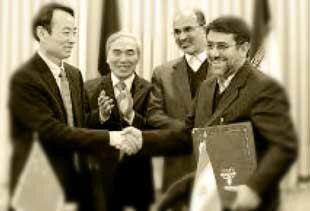China is Now World's Second Largest Oil Consumer
By Energy Economics (Eghtesad & Energy)
Tehran, Nov. 29, 09
China’s dependence on Iranian oil could deter it from backing tougher sanctions on Iran, though Beijing supports containing nuclear proliferation as part of a broader push to raise its international diplomatic stance.
China’s trade with the U.S., at $150 billion in the first seven months of this year, dwarfs its $12 billion trade with Iran over the same period. But China is the world’s second-biggest oil consumer after the U.S., and the Persian Gulf country is one of Beijing’s biggest suppliers. Chinese imports of Iranian crude grew to 13 million metric tons in the first half, about 15% of China’s total, and up 22% from a year earlier, according to government data.
China’s reaction to the revelations that Iran has a secret nuclear plant has been muted thus far. Despite the diplomatic talk, there are signs that China’s leaders could be willing to take a tougher stance on nuclear proliferation as they weigh the impact of destabilizing regional arms races on their trade-dependent economy.
Although China would prefer a negotiated settlement, “we have to keep it clear, commitment to nuclear non-proliferation is China’s bottom line,” said Yin Gang,
a scholar at the Institute of West Asian and African Studies of the government-affiliated Chinese Academy of Social Sciences.
With Iran flouting previous United Nations efforts, patience is running thin, he said, and Iran shouldn’t count on China’s unconditional support. “If the solution to the nuclear issue is through non-political means, or a military attack cannot be avoided, I don’t think China has the power to stop such [a] military attack,” said Mr. Yin. He added that even though China and Iran are old friends “it doesn’t mean that Iran
could expect that when it comes to the nuclear issues, [China’s] interests are bound together with Iran’s.”
Recent action on North Korea, another long-time China ally with nuclear ambitions, shows how China’s position on nuclear arms has stiffened. In May, China supported U.N. sanctions against North Korea after its second nuclear test clearly angered China’s leaders.
And before the U.S. invasion of Iraq, China declined to exercise its U.N. Security Council veto on action against Iraq.
Nonetheless, China’s oil companies have been strengthening their ties to Iran’s oil industry in recent months. Chinese state-owned oil companies recently have signed a string of multibillion-dollar deals to develop Iranian oil and gas fields, filling a gap left after Iran’s talks with major Western oil companies collapsed under the growing threat of nuclear sanctions.
Some big Western oil traders have recently scaled back or are preparing to halt fuel shipments to Iran in anticipation of sanctions, leaving an opening for Chinese fuel traders.
Oil companies in China — the second-biggest buyer of Iranian crude after Japan — have stepped up investment.
China National Petroleum Corp., the flagship state - owned oil company, has signed billion-dollar contracts to develop oil and natural gas fields, replacing other foreign companies that have backed out. China’s biggest oil refiner, state-owned Sinopec Group, has also signed on to develop Iranian oil fields.
MSN - - - Wikipedia - Hamsayeh.Net


